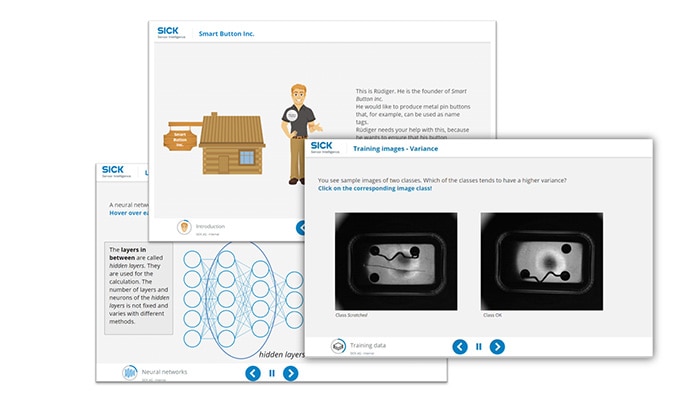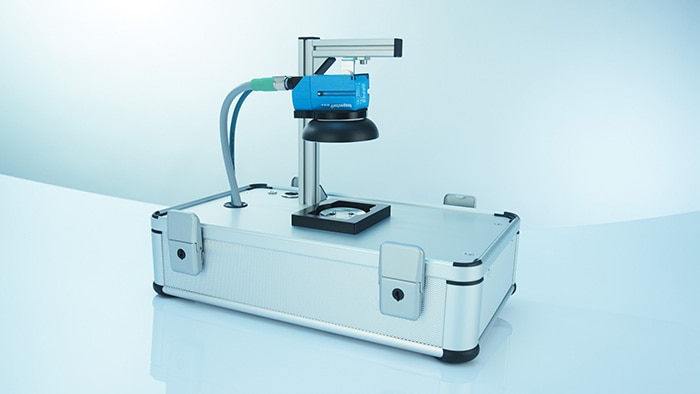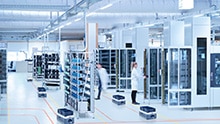Artificial intelligence, or AI for short, is a term that we now encounter more and more often in everyday life. Robots or intelligent software programs take care of tasks that previously could only be performed by computers to a very limited extent and were therefore often performed by humans. In daily life today, it is hard to avoid using artificial intelligence as a tool in some form or another - whether consciously or unconsciously. It supports us, for example, when we use navigation devices, play video games, or even when we use the camera on our smartphone. But there are also more obvious use cases, such as autonomous driving or using voice assistants at home or on your smartphone. So-called neural networks, which are modeled on the way the human brain works, are increasingly being used in the background. They are an important component of Deep Learning, a special subtype of AI.
Artificial intelligence is also finding its way into industry. With the increasing use of this technology, it is becoming more and more important to understand what it actually is, what Deep Learning is all about or how neural networks are generated in a targeted manner and how they can be used in a meaningful way in industry to optimize production processes. These questions arise especially when it comes to repetitive, monotonous tasks that computers have not yet been able to achieve and are therefore still laboriously performed by humans. Artificial intelligence is an attempt to understand and artificially imitate the way the human brain works. The goal: Computers should reliably perform even demanding tasks, such as quality control using image recognition – in particular of organic objects.
The Educational Set Artificial Intelligence was designed for trainers, instructors, teachers and professors in various educational institutions so they can experience the topic of artificial intelligence first-hand with learners and be able to teach AI-related competencies as practically and vividly as possible.
The contents of the educational set include real industrial hardware and software that are also used in the same form in numerous companies. The educational set is supplemented by teaching materials, for example an e-learning course as an introduction to the topic or an experiment manual with didactically designed tasks and sample solutions.
To acquire a comprehensive understanding of Deep Learning, it is essential to not only gain theoretical knowledge about it, but to actually work with it, make mistakes, and then fix them on your own. A curriculum covering the following points has therefore been designed so that interested persons can gain hands-on experience in creating their own neural networks.
- In an interactive e-learning course, learners are prepared for the classroom training. The course conveys basic background knowledge and aims to bring the different levels of knowledge of the individual participants up to a consistent level.
- A short digital quiz can be used later, a few days before the classroom session, to refresh and also consolidate the knowledge acquired in the e-learning course so that it can be retrieved during the classroom training.
- A set of printable experiment instructions (with sample solutions) and example flowcharts help participants perform tasks using a real industrial sensor. The auxiliary materials included in the set, e.g., cubes or metal badges, are used to solve the tasks in the experiment instructions intuitively and in a step-by-step manner. Using the InspectorP621 programmable camera from SICK and the cloud-based SICK dStudio industrial software, learners can create their own neural networks and then transfer them to the camera. The learners experience how the camera independently grades the quality control results into previously defined classes based on the neural network created.
Five didactically prepared tasks have been designed for the kit, which build on each other and aim to ensure the most lasting acquisition of the competencies with real practical knowledge.
Finally, in the sixth and last task, the neural network independently created by the learners is transferred to a real production system in a 3D computer simulation to verify the quality of the neural network. This task rounds off the learning unit and at the same time serves to motivate the participants.
Various scenarios in the kit can be shortened or used in their entirety – and are definitely also suitable for beginners. The hardware and software also allow learners to design their own tasks, so it is not absolutely necessary to follow the supplied experiment instructions. It is even possible to replace the software on the sensor in order to design or solve particularly complex tasks using the sensor.
Click here to find out more about how to purchase the educational kit.
Do you have any questions?
The learning offerings at a glance
The Sensor Intelligence Academy campus
Aachen Demonstration Factory -– experience Industry 4.0 directly






